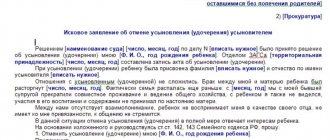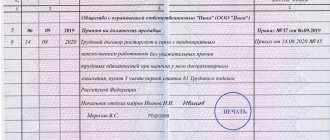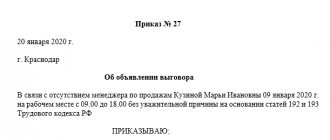Does Article 192 of the Labor Code of the Russian Federation define a reprimand as a type of disciplinary sanction?
A reprimand, along with measures such as reprimand and dismissal, in accordance with the provisions of Art. 192 of the Labor Code of the Russian Federation is a type of disciplinary sanction. At the same time, the management of the enterprise must clearly understand why an employee can be reprimanded. The practical significance of a reprimand can be expressed in 2 main aspects:
- Firstly, a reprimand as a disciplinary sanction may be one of the legal grounds for the dismissal of an employee (Clause 5 of Article 81 of the Labor Code of the Russian Federation) for repeated failure to fulfill duties in the presence of a disciplinary sanction. At the same time, a reprimand, on the one hand, is a disciplinary sanction, and on the other hand, it is a fact that indicates at least a one-time failure by the employee to fulfill his duties. 2 reprimands, provided that they are legal (how to ensure their compliance with this, we will consider later), give the employer the right to dismiss the employee. But only if they were issued for various offenses (Article 193 of the Labor Code of the Russian Federation).
- Secondly, a reprimand can be considered as one of the measures to improve production discipline. From this point of view, its imposition has more psychological than legal significance. An employee who has received a reprimand recorded in his personal file will most likely want to rehabilitate himself in the eyes of the employer and will begin to work better.
How to reprimand for improper performance of official duties
The official issuance of a reprimand is a legal fact, so this procedure must be properly formalized. The Labor Code of the Russian Federation and other federal regulations do not contain regulations that would determine how a reprimand is issued, but, based on practice, this action is recommended to be carried out according to the following algorithm:
- Firstly, the employer must document the fact of failure (or incorrect performance) by the employee of his duties. Most often, this is done by sending a memo to the director of the company by the immediate supervisor of the employee who committed the misconduct. An offense can also be recorded using a report drawn up by a commission formed by the head of the company to evaluate the employee’s actions.
- Secondly, the employer, before issuing a reprimand, must give the employee the opportunity to explain the actions he committed. To do this, it is necessary to send the employee a notice of the submission of an explanatory note.
- Thirdly, the employer needs to wait 2 days - this is how much time the employee has to draw up an explanatory note (Article 193 of the Labor Code of the Russian Federation). If he does not do this, the employer should draw up a corresponding act. Further (and also in the event that an explanation is presented, but the employee’s arguments do not look convincing), a reprimand can already be issued.
A reprimand is issued by issuing an order signed by the head of the company.
The order to issue a reprimand must:
- indicate that all the documents that we mentioned above are attached to it: a memorandum of misconduct (or an act of the commission), a notice of the need to submit an explanatory note, the explanatory note itself or an act of failure to submit it;
- indicate the dates and names of the relevant documents.
The order to issue a reprimand must be signed by:
- head of the company;
- by the employee himself within 3 days from the date of drawing up the order.
If the employee refuses to sign the document, it will be necessary to draw up a report about this (Article 193 of the Labor Code of the Russian Federation).
Information about the reprimand of an employee can be recorded in the personal file.
Is it possible to reprimand without reprimand and is it issued for absence from work?
A remark is also a disciplinary sanction, but is considered a milder sanction, since Art. 192 of the Labor Code of the Russian Federation is slightly higher in the list of punishments. A reasonable question arises: should a reprimand be preceded by a reprimand, or can it be avoided?
Labor legislation does not rank punishments according to the degree of guilt and does not establish a strict sequence for their imposition. Therefore, the employer himself has the right to assess how great the employee’s guilt in the violation is and what sanction he deserves.
Thus, a reprimand may be issued for absence from work if there were valid reasons for missing work time, a reprimand may be issued if this was done deliberately without significant grounds, and even dismissal is possible when such a violation is systemic in nature.
Here only one constant principle should be observed: one violation - one type of punishment.
When is a reprimand issued?
A reprimand, like any other disciplinary sanction, must be issued by the employer within a month after the employee’s misconduct is revealed. The company has no right to punish the employee later. This period may be extended if the employee is absent from work due to being on sick leave or on vacation (including study).
The maximum period within which an employer has the right to issue a reprimand is 6 months. However, if a misconduct is revealed during an audit (for example, an audit), a reprimand can be issued no more than 2 years from the established date of the commission of this misconduct.
Is it possible to challenge?
If an employee does not agree with the penalty applied to him, then he has the right to challenge the employer’s decision. The conflict can be resolved personally with the head of the enterprise or through bodies authorized to take such actions. The law defines a regulated period of three months within which it is possible to file a claim for an unlawfully applied sanction. After their expiration, the employer’s decision cannot be challenged.
If it is determined that an illegal reprimand has been issued, the employer will be assessed a fine of up to 50,000 rubles. However, in practice, if the procedure is properly executed, the court always takes the side of the defendant, who in this situation is the head of the enterprise.
UTF-8
Sample reprimand for improper performance of official duties
In order not to create a new document every time and not remember how this or that information is presented in it, it is better for the company to use a ready-made template. We present one version of the document on the website. Before reprimanding an employee, management will have to take this example as a basis and, if necessary, changing the wording and surname of the offending employee, print the required order.
Basis for the order
Absolutely any order drawn up on behalf of the company’s management must have a written basis. In most cases, this is
- a memorandum or memo from the head of the structural unit in which the offending employee works,
- as well as an act recording the offense and an explanatory note.
Without these papers, the document will not be considered justified and in which case it will be very easy to refute it; moreover, for the lack of a basis for writing the order, and therefore the penalty itself, the employer may be subject to administrative punishment.
How can an employer cancel a reprimand?
It happens that the employer comes to the conclusion that the employee was punished unlawfully and wants to remove the reprimand from him. How can I do that?
Very simple. All that is required to cancel a reprimand is to issue an appropriate order from the head of the company. It can be drawn up at any time (Article 194 of the Labor Code of the Russian Federation). The order to remove the reprimand must contain a reference to the order to issue the reprimand, indicating its date and number. You can see a sample order to remove a reprimand in the ConsultantPlus system. To do this, sign up for a free trial access to the system.
The employee himself or his immediate superior can also apply to have the reprimand lifted.
A sample of drawing up a petition to lift a disciplinary sanction was prepared by K+ experts. Get a free trial access to the system and proceed to the sample.
An employee is considered to have a disciplinary sanction after it has been issued for exactly 1 year, if during this time he does not commit other offenses, followed by other disciplinary sanctions (Article 194 of the Labor Code of the Russian Federation). In this regard, there is one more option for removing a reprimand from an employee - wait for its automatic cancellation.
Legal consequences of a reprimand for an employee at work
According to Art. 66 of the Labor Code of the Russian Federation, data on the reprimand are not recorded in the work book. As a last resort, the personnel service may (but is not obligated to) enter information about the reprimand into the employee’s personal card, which is an internal document. So the new employer, as well as any other entity, most likely will not know that any disciplinary action has been taken against the person.
This means that from the point of view of relations with the new employer (or some other persons legally independent of the current employer), the presence of a reprimand at work will not have significant legal consequences for the employee.
But the employee may be interested in maintaining his current job. And in this case, it will be useful for him to pay attention to one nuance.
In accordance with paragraph 5 of Art. 81 of the Labor Code of the Russian Federation, the employer has the right to dismiss an employee if he repeatedly fails to fulfill his official duties. This includes an offense for which the employee was reprimanded. The nuance is that the employer can use the following interesting mechanism for applying the norms of paragraph 5 of Art. 81 of the Labor Code of the Russian Federation, taking into account the provisions of Art. 193 of the Labor Code of the Russian Federation, establishing a one-month period for issuing disciplinary sanctions.
Having discovered an employee’s misconduct, the employer can, according to the established scheme, reprimand him and immediately issue a new order - for some other offense within a month’s prescription (if, of course, there was such an offense).
It turns out that the employer will have 2 proven facts of violation of labor discipline and he will immediately have the right to dismiss the employee. So employees who have once committed an offense to which the employer seems to have turned a blind eye should not provoke their superiors to impose an official disciplinary sanction - it may have direct legal consequences for them in the form of dismissal.
Rules for placing an order
The order can be drawn up in different versions: both in handwritten format and in printed form, both on a simple A4 sheet and on the company’s letterhead. However, he must have the original autograph of the director of the company or a person authorized to sign such papers. It is not necessary to endorse it using a seal, since it relates to the internal administrative documentation of the company; moreover, since 2016, legal entities are exempt from the need to certify their documentation using seals and stamps.
Reprimanding an employee: legal consequences for the employer
A reprimand is a legal fact, and it must be correctly executed. Many people forget that, for example, the Labor Code of the Russian Federation does not provide for any severe reprimands. The employer has no right to officially use this phrase. If he nevertheless gives the employee a severe reprimand, then the labor inspectorate (if the employee complains there) can:
- firstly, impose an impressive fine on the company based on clause 1 of Art. 5.27 Code of Administrative Offenses of the Russian Federation;
- and secondly, to cancel the order imposing a severe reprimand.
In addition, the employer has the right to impose any disciplinary sanction, including a reprimand, only if the employee fails to perform or performs his job duties incorrectly. However, these responsibilities must be recorded somewhere: in a contract, job description, labor regulations. And if the employer for some reason did not familiarize the employee with his duties against signature, then he does not have the right to reprimand for their failure to fulfill them.
Dismissal on the basis of a severe reprimand, other non-existent disciplinary sanctions, as well as when the reprimand is issued outside the regulatory framework, can be successfully appealed by the employee in court with a high probability of success. As a result, the court may oblige the employer to reinstate the person at work. And immediately. If the company does not do this, it will have to pay the employee a salary for the time that he was absent from the workplace, although by virtue of a court decision he should have been present (Article 396 of the Labor Code of the Russian Federation).
If you want more stringent measures
Alternative measures of influence on guilty employees, not provided for by the Labor Code of the Russian Federation, are unacceptable. For violations of employee discipline, it is not permitted to:
- demote;
- impose a fine;
- reschedule or cancel their vacation;
- withhold part of the salary, etc.
If the labor inspectorate, as a result of an inspection or complaint, reveals any form of punishment for a disciplinary offense, other than a reprimand or reprimand, the employer will receive an order for a serious fine, and the penalty imposed on the employee will have to be removed.
ATTENTION! If money is illegally withheld from an employee as punishment, then upon appeal, the employer will not only be obliged to return it, but also to pay a penalty for the delay in wages.
The only form of punishment more severe than a reprimand and reprimand is the dismissal of the offending employee, if the reason for this is sufficient.









